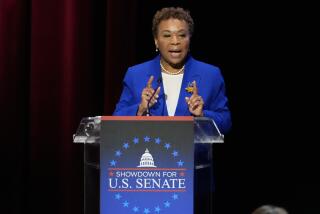Key Senator Opposes Civil Rights Nominee
WASHINGTON — The chairman of the Senate Judiciary Committee announced his opposition Tuesday to the nomination of Los Angeles lawyer Bill Lann Lee as head of the Justice Department’s civil rights division, a move that could kill the appointment if other committee Republicans join him.
The chairman, Sen. Orrin G. Hatch (R-Utah), told the Senate that not only is Lee a fervent opponent of California’s Proposition 209, which was upheld by the Supreme Court this week, but that he has shown a “cramped and distorted” view of the civil rights statutes that he would be sworn to uphold.
President Clinton expressed astonishment at Hatch’s position and said that the White House would lobby other committee members to support Lee or, failing that, at least to allow the full Senate to vote on his nomination.
Declaring that Lee, the son of Chinese immigrants, has “worked his heart out all his life,” Clinton asked: “How can anybody in good conscience vote against him if they believe that our civil rights laws ought to be enforced?”
He called Lee “superbly qualified” and urged the Senate to reflect the “bipartisan consensus in the United States for enforcing the civil rights laws of America.”
Meanwhile, a coalition of conservative groups joined the effort to defeat Lee, whose nomination was earlier criticized by 16 House Republicans from California. The groups included the Washington-based Institute for Justice and the U.S. Pan Asian American Chamber of Commerce, which said that Lee had long favored racial quotas and “preferential treatment based on skin color and gender.”
Linda Chavez, a former director of the Civil Rights Commission in the Reagan administration who heads the Center for Equal Opportunity, warned that if Lee is confirmed, “the full weight of the federal government’s executive branch will be thrown behind maintaining and expanding the use of preferences based on race, ethnicity and sex.”
With a committee vote approaching Thursday, Hatch said in his Senate speech that it pained him to oppose Lee because the nominee had “a compelling personal history” of working hard to rise above “the scourge of bigotry” to become a successful lawyer. Lee has been western regional counsel of the NAACP Legal Defense Fund, an organization known for its unwavering support of affirmative action.
While calling Lee a “very fine human being,” Hatch said that, as assistant attorney general for civil rights, Lee “must be America’s civil rights law enforcer, not the civil rights ombudsman for the political left.”
He expressed concern that at his recent confirmation hearing Lee signaled scant support for a law sponsored by Hatch that places limits on judicial control of federal prisons. He added that Lee had sought a consent decree that would have established aggressive goals for hiring and promoting women and minorities in the Los Angeles Police Department.
“While I do not question Mr. Lee’s integrity, I am concerned about his commitment to serve every citizen of the nation in equal measure,” Hatch said.
Senate Minority Leader Tom Daschle (D-S.D), asked if Hatch’s opposition kills the nomination, replied: “It doesn’t do it any real good.” But he said that he is “not prepared to say it’s dead yet.”
Some key Republicans on the Judiciary Committee were keeping their own counsel, but Democratic sources said they expect Sen. Arlen Specter (R-Pa.) to vote in favor of Lee. At least one more Republican might be needed to join the panel’s eight Democrats in a vote to forward the nomination to the full Senate.
A tie vote amounts to refusal to recommend confirmation and only once in history has the full Senate approved a nominee who failed to gain a positive recommendation from the committee. That occurred in the 1991 nomination of Clarence Thomas to the Supreme Court when the committee deadlocked, 7-7, on a motion to endorse Thomas.
The administration’s strategy of pushing for a full Senate vote is based on the belief that a majority of senators would not necessarily fall in line with the committee.
“If it goes to the full floor, we don’t think the same handful of right-wingers will prevail,” said an administration official involved in the effort to win Lee’s confirmation.
The official, who declined to be identified, said, “Who do they think they’re going to get” if Lee’s nomination is rejected?
“This is a president in his second term who has clearly stated his position in favor of affirmative action.”
Times staff writers Ronald J. Ostrow and Elizabeth Shogren contributed to this story.
More to Read
Get the L.A. Times Politics newsletter
Deeply reported insights into legislation, politics and policy from Sacramento, Washington and beyond. In your inbox three times per week.
You may occasionally receive promotional content from the Los Angeles Times.











